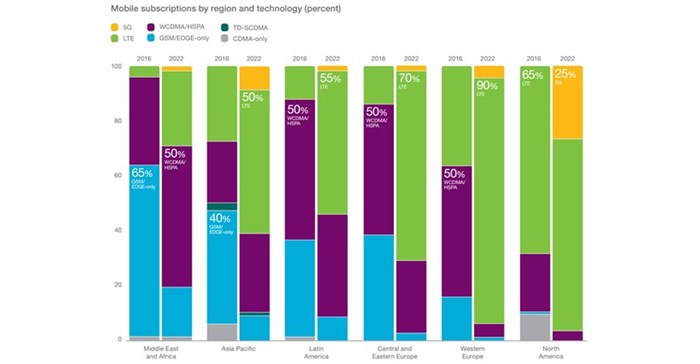Ericsson's Sub-Saharan Africa Mobility Report reveals that while total mobile subscriptions penetration in the region is currently 85%, this number is expected to reach 105% by 2022 with over 1 billion mobile subscriptions.
This makes Sub-Saharan Africa the region with highest growth rate in mobile subscriptions globally.
- Half a billion 5G subscriptions in 2022 with 25% in North America, representing the highest market penetration in the world.
- Mobile broadband to account for 90% of global and around 83% of Sub-Saharan Africa subscriptions by 2022.
- Cellular Internet of Things (IoT) connections to grow from 11 million in 2016 to 75 million connections in 2022 in Sub-Saharan Africa.
Released this week, the latest edition of the Ericsson Mobility Report forecasts that there will be 550 million 5G subscriptions in 2022. North America will lead the way in uptake of 5G subscriptions, where a quarter of all mobile subscriptions are forecast to be for 5G in 2022.
Asia Pacific will be the second fastest growing region for 5G subscriptions, with 10% of all subscriptions being 5G in 2022.
This year, Ericsson has published five Regional Reports with the Global Mobility Report. From 2016 to 2022, Sub-Saharan Africa will dramatically shift from a region with a majority of GSM/EDGE-only subscriptions, to around 83 % of all subscriptions on WCDMA/HSPA and LTE.
By the end of 2016, there will be 3.9 billion smartphone subscriptions globally. Almost 90% of these subscriptions will be registered on WCDMA/HSPA and LTE networks. By 2022, the number of smartphone subscriptions is forecast to reach 6.8 billion, with more than 95% of the subscriptions registered on WCDMA/HSPA, LTE and 5G networks. In Sub-Saharan Africa smartphones penetration will reach around 80% by 2022 while mobile subscriptions on smartphones will rise by 21% annually from 2016 to 2022.
The report also highlights the role Internet of Things plays in providing new means to deliver efficient, innovative solutions that meet socio-economic challenges and transform business models to unlock growth in sub-Saharan Africa. Across sub-Saharan Africa, the report projects cellular IoT connections growing from 11 million in 2016 to 75 million connections in 2022.
The latest Ericsson Mobility Report also forecasts that in 2022, there will be 8.9 billion mobile subscriptions, of which 90 % will be for mobile broadband. At this point in time, there will be 6.1 billion unique subscribers.
Mobile data traffic growth
As of Q3 2016, 84 million new mobile subscriptions were added during the quarter to reach a total of 7.5 billion, growing at around 3% year-on-year. India grew the most in terms of net additions during the quarter (+15 million), followed by China (+14 million), Indonesia (+6 million), Myanmar (+4 million) and the Philippines (+4 million).
Mobile broadband subscriptions are growing by around 25% year-on-year, increasing by approximately 190 million in Q3 2016 alone. The total number of mobile broadband subscriptions is now around 4.1 billion.
Mobile data traffic continues to grow, driven both by increased smartphone subscriptions and a continued increase in average data volume per subscription, fueled primarily by more viewing of video content. In Q3 2016, data traffic grew around 10% quarter-on-quarter and 50% year-on-year.
A rise in access and viewing of video content is also a driver for mobile data traffic growth in Sub-Saharan Africa. Other drivers are wider network coverage, continued reduction in prices of both devices and services and a growing population with 57% of the current population under 15 years old.
Jean-Claude Geha, president of Ericsson Sub-Saharan Africa says: “Data traffic is forecast to grow by around 55% annually between 2016 and 2022, that is a 13 times growth. This rapid growth is driving operators to explore methods of optimising network capacity, one of which is complementing traffic via Wi-Fi networks – with traffic expected to rise 70% annually between 2016 and 2022.”
Further highlights from the Ericsson Mobility Report include:
- Mobile video traffic is increasingly dominant: Mobile video traffic is forecast to grow by around 50% annually through 2022 to account for nearly 75% of all mobile data traffic. Social networking is the second biggest data traffic type after video, forecast to grow by 39% annually over the coming six years.
- Live streaming joins social media: Consumers are increasingly using live video streaming apps to interact with friends, family and followers. Around one in five smartphone users in the US express an interest in live video broadcasting, with twice as many smartphone users in high growth markets like India, Indonesia, Brazil and Oman who are interested in such apps.
- IoT in focus: Around 29 billion connected devices are forecast by 2022, of which around 18 billion will be related to IoT. Included in the latest edition of the Ericsson Mobility Report is a deeper look into IoT, with three feature articles with different perspectives on IoT and its transformational potential. Two articles are co-written with operators that have built IoT solutions around their core assets, creating additional business value. The third article explores the cellular networks’ capabilities to support a realistic massive IoT use case scenario.
The Ericsson Mobility Report is an industry-leading publication on mobile data traffic, providing in-depth measurements from live networks spread around the globe. The report uses these measurements and analysis, together with internal forecasts and other relevant studies, to provide insights into current traffic and market trends in the Networked Society.
The Traffic Exploration Tool, which accompanies the report, can be used to create customized graphs and tables. The information can be filtered by region, subscription, technology, traffic and device type.
*The full Ericsson Mobility Report and Traffic Exploration Tool can be downloaded at www.ericsson.com/mobility-report.


























